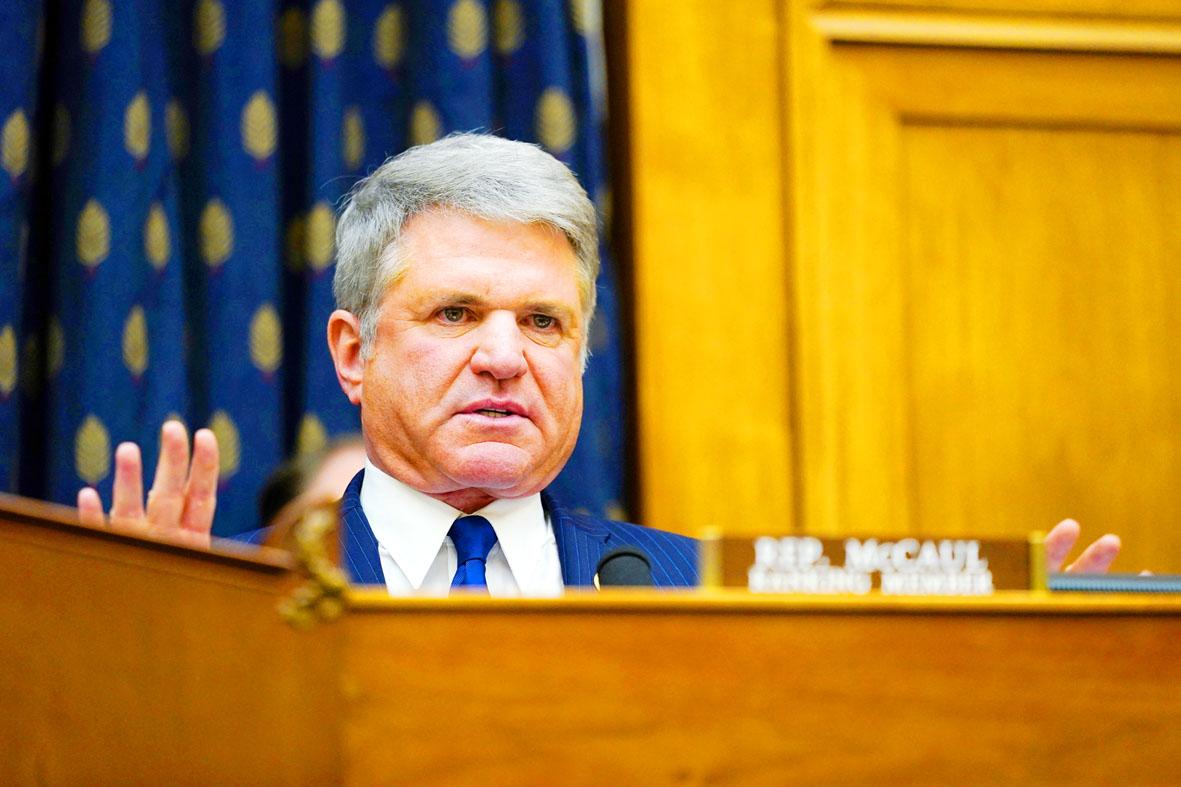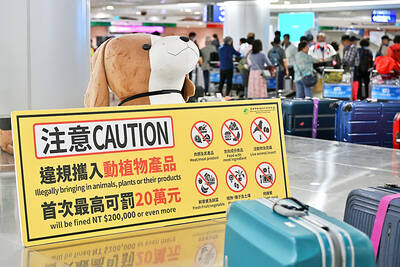Two US lawmakers on Thursday introduced a bill to the US Congress to track and expedite the delivery of US arms sold to Taiwan amid growing tensions between Taipei and Beijing.
The arms exports delivery solutions act was introduced by Republican US representatives Young Kim and Michael McCaul, who are both on the US House of Representatives Foreign Affairs Committee.
The bill seeks to ensure that “defense equipment already purchased from the US by Taiwan and other allies in the [Indo-Pacific] region are tracked and delivered as efficiently as possible as the Chinese Communist Party [CCP] eyes further aggression,” Kim said in a statement.

Photo: AP
“Delayed deliveries of congressionally approved sales to Taiwan are undermining our ability to deter an attack from China,” McCaul said. “This is incredibly concerning as China ramps up its belligerence towards Taiwan.”
China says it wants to unify with Taiwan through peaceful means, although it has not denounced the use of force to achieve that goal. It has stepped up economic, political and military pressure on Taipei over the past few years, as the Democratic Progressive Party government refuses to accept the so-called “1992 consensus.”
Beijing has also accused Taipei and Washington of trying to alter the “status quo” in the Taiwan Strait. It has repeatedly sent military aircraft into Taiwan’s air defense identification zone, drawing condemnations from Taipei and Washington.
As a result, some US lawmakers have spoken out in favor of prioritizing weapons sales and deliveries to Taiwan.
The bill would require US President Joe Biden’s administration to submit a report to Congress before March 1 next year listing the approved sales of US defense articles or services worth US$25 million or more to Taiwan, Japan, South Korea, Australia and New Zealand that have not been fully delivered.
The report should provide reasons for any changes or delays on the part of the US in its transfer of the approved defense items while outlining possible measures the US can take with the Congress’ authorization to provide “interim capabilities or solutions” to its partners subject to such delays.
The report should also provide a description of “the actions the United States is taking to expedite deliveries of defense articles and services to Taiwan,” the bill says.
Prioritizing the defense needs of Washington’s allies and partners is “a national security priority,” and the US’ sustained support for the defense of its key partners benefits Americans and international trade, it says.
The “1992 consensus” — a term that former Mainland Affairs Council chairman Su Chi (蘇起) in 2006 admitted making up in 2000 — refers to a tacit understanding between the Chinese Nationalist Party (KMT) and the CCP that both sides of the Taiwan Strait acknowledge that there is “one China,” with each side having its own interpretation of what “China” means.

UKRAINE, NVIDIA: The US leader said the subject of Russia’s war had come up ‘very strongly,’ while Jenson Huang was hoping that the conversation was good Chinese President Xi Jinping (習近平) and US President Donald Trump had differing takes following their meeting in Busan, South Korea, yesterday. Xi said that the two sides should complete follow-up work as soon as possible to deliver tangible results that would provide “peace of mind” to China, the US and the rest of the world, while Trump hailed the “great success” of the talks. The two discussed trade, including a deal to reduce tariffs slapped on China for its role in the fentanyl trade, as well as cooperation in ending the war in Ukraine, among other issues, but they did not mention

Japanese Prime Minister Sanae Takaichi yesterday lavished US President Donald Trump with praise and vows of a “golden age” of ties on his visit to Tokyo, before inking a deal with Washington aimed at securing critical minerals. Takaichi — Japan’s first female prime minister — pulled out all the stops for Trump in her opening test on the international stage and even announced that she would nominate him for a Nobel Peace Prize, the White House said. Trump has become increasingly focused on the Nobel since his return to power in January and claims to have ended several conflicts around the world,

REASSURANCE: The US said Taiwan’s interests would not be harmed during the talk and that it remains steadfast in its support for the nation, the foreign minister said US President Donald Trump on Friday said he would bring up Taiwan with Chinese President Xi Jinping (習近平) during a meeting on the sidelines of the APEC Summit in South Korea this week. “I will be talking about Taiwan [with Xi],” Trump told reporters before he departed for his trip to Asia, adding that he had “a lot of respect for Taiwan.” “We have a lot to talk about with President Xi, and he has a lot to talk about with us. I think we’ll have a good meeting,” Trump said. Taiwan has long been a contentious issue between the US and China.

Taiwan’s first African swine fever (ASF) case has been confirmed and would soon be reported to the World Organization for Animal Health (WOAH), Minister of Agriculture Chen Junne-jih (陳駿季) yesterday. The Ministry of Agriculture’s Veterinary Research Institute yesterday completed the analysis of samples collected on Tuesday from dead pigs at a hog farm in Taichung and found they were ASF-positive. Animal and Plant Health Inspection Agency Animal Quarantine Division chief Lin Nien-nung (林念農) said the result would be reported to the WOAH and Taiwan’s major trade partners would also be notified, adding that pork exports would be suspended. As of Friday, all samples